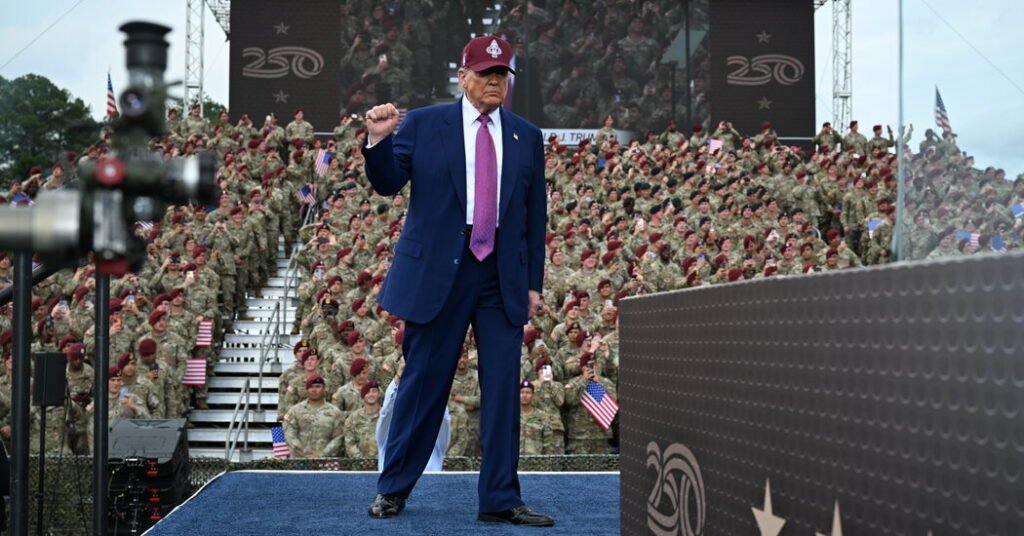On Tuesday, during their private weekly luncheon, Democratic senators received insights from their California counterparts, Alex Padilla and Adam Schiff. They made a clear distinction between the few instances of vandalism in Los Angeles and the larger crowd of peaceful demonstrators opposing President Trump’s deportation policies.
Around the same time, President Trump was in the Oval Office recounting violent incidents, highlighting, “Did you see the guy throwing rocks at the police cars?” while cameras recorded him.
For Democrats, the limited yet intense unrest in Southern California has spotlighted two issues that have favored Republicans in recent years: immigration and crime. Party leaders are concerned that Trump’s provocations could create a perilous political trap that they can’t ignore. As protests spread to other cities, the mayor of Los Angeles implemented a curfew for certain areas on Tuesday night.
President Trump’s controversial decision to deploy military troops to manage domestic protesters, despite objections from local leaders, including Governor Gavin Newsom, has sparked significant backlash from Democrats. They argue that his actions are authoritarian and violate the Constitution.
In an interview, Adam Schiff urged his party to oppose Trump without falling into his political narrative.
“The president aims to create chaos in L.A. to showcase his strength by then cracking down on the disorder,” stated Schiff, who has had numerous confrontations with Trump and led the initial impeachment. “The president is a chaos agent who thrives on disorder and uses it to present himself as a strong leader.”
Trump has seized upon disturbing images of burning cars, vandalized properties, and masked protesters with foreign flags to justify his claims for a strong response. He often uses these instances as a rationale for deploying National Guard troops and Marines, even against Newsom’s wishes.
Polls consistently indicate that immigration and crime are weaknesses for the Democrats. Some party members express concern that without clear statements condemning violence, the party may appear lenient on crime.
Senator John Fetterman from Pennsylvania, a Democrat who has increasingly diverged from his party, labeled the events in Los Angeles as “anarchy and true chaos.” He shared an image circulated by Republicans depicting a masked individual waving a Mexican flag atop a vandalized car engulfed in flames.
“My party loses its moral authority when we refuse to condemn acts like setting cars on fire, destroying buildings, and attacking law enforcement,” posted Fetterman on Monday.
The ongoing political and street confrontations between Trump’s strict immigration policies and the nation’s largest Democratic state felt almost unavoidable.
“We all anticipated that this moment would arrive,” remarked Representative Jimmy Gomez of California on Tuesday at the Capitol, surrounded by fellow state Democrats.
On Tuesday, Newsom requested a judge to halt the planned troop deployment by the Trump administration. Additionally, a notable House Democrat suggested that Trump’s actions could be grounds for impeachment.
Yet, as Democrats respond, immigration enforcement remains a deeply divisive issue within the party, with some members shifting rightward alongside American public sentiment. Many prominent Democrats have denounced the violence and referenced local officials who report that such events have been mostly isolated.
“This is a crisis fabricated by Trump, beginning with his increasing theatrics, cruelty, and aggressive ICE raids,” stated Senator Padilla in an interview. “We must hold Trump accountable while reminding everyone that he’s doing this to distract from his failing agenda.”
Newsom has utilized his clash with Trump—who has hinted at arresting him—to elevate his status as a prominent Democratic counter to Trump on a national scale, responding dramatically to the president’s remarks as they happen.
As the weekend approached, the U.S. political scene was captivated by the dramatic fallout between Elon Musk and Trump. Musk criticized the core of Trump’s legislative agenda as a “disgusting abomination,” provoking Trump to threaten retaliation against his business ventures.
Now, the focus has shifted to California, where Trump appears to be testing the limits of his authority. His deployment of federal troops without state approval is unprecedented since troops were sent to protect civil rights demonstrators in Alabama more than fifty years ago.
The current climate has drawn comparisons to the protests and riots that erupted after George Floyd, an unarmed Black man, was killed by a Minneapolis police officer five years prior. The political repercussions of this unrest—a racial reckoning followed by backlash—are still felt by both parties.
Another potential flashpoint is on the horizon this weekend with Trump’s planned military parade for the Army’s 250th anniversary, which coincides with his own birthday. “Those who want to protest will face a significant show of force,” he warned.
Trump and his aides, including Stephen Miller, his long-time advisor on immigration, seem focused on redefining the term “insurrectionist,” which has frequently referred to the rioters from the January 6 Capitol incident, now targeting anti-deportation demonstrators and Democrats.
“This exemplifies insurrection,” Miller commented on X about Los Angeles Mayor Karen Bass after she called for an end to federal immigration raids.
Schiff remarked that such messaging “would be amusing were it not so outrageous” coming from a White House that pardoned the January 6 participants. He urged his party to view Trump’s actions not only as an overreach but as a fundamental violation of his responsibilities.
Commits to prioritizing border security and the removal of violent offenders who have entered the country unlawfully.
“The president assured he would concentrate on deporting violent offenders, but that promise has been broken,” stated Mr. Schiff.
Frank Sharry, founder of America’s Voice and a long-time supporter of immigration reform, noted that the absence of a cohesive Democratic strategy on immigration—how to manage border security and individuals already in the country unlawfully—is hindering the party’s ability to respond effectively.
“Some Democrats hesitate to fully embrace immigration policy because they lack a strong defense, and what they really need is a solid offense,” explained Mr. Sharry. “With a clear, solution-focused immigration stance, Democrats could highlight their pragmatism against Trump’s extremism, leading to a potentially favorable debate for them.”


